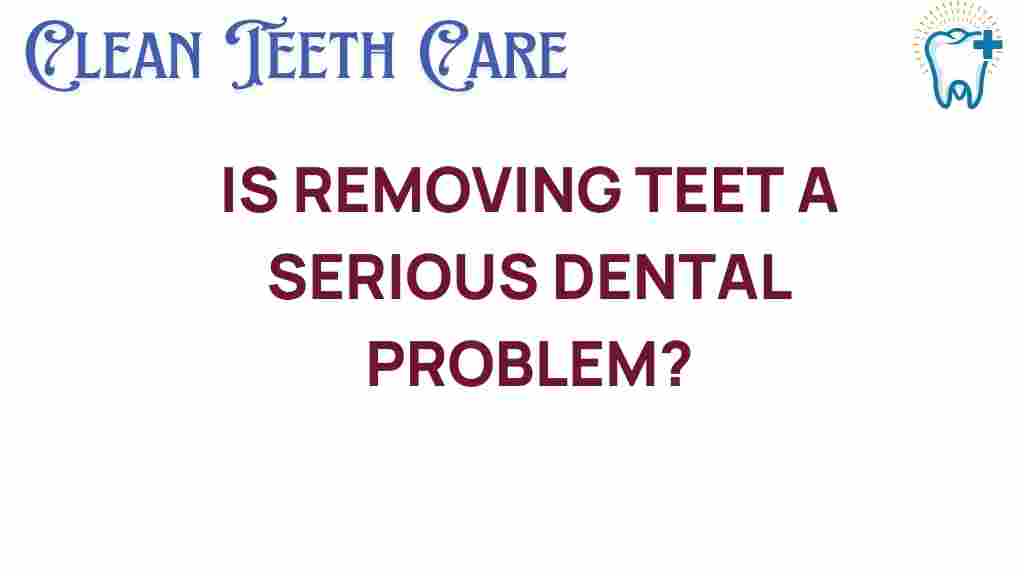Is Tooth Removal a Hidden Dental Dilemma?
Tooth removal often stands as a significant concern for many individuals navigating the landscape of dental health. While it may seem straightforward to some, the implications of this procedure can be far-reaching, making it essential to understand the nuances involved. In this article, we will delve into the various aspects of tooth removal, including its necessity, potential complications, and ways to maintain optimal oral care before and after the procedure. Our goal is to equip you with the knowledge to make informed decisions regarding your dental hygiene.
Understanding Tooth Removal
Tooth removal, also known as tooth extraction, involves the complete removal of a tooth from its socket in the bone. This procedure is typically performed by a dentist or oral surgeon and can be necessary for various reasons, including:
- Severe tooth decay
- Infection in the tooth or surrounding areas
- Overcrowding in the mouth
- Impacted wisdom teeth
- Gum disease leading to tooth loosening
Complications Associated with Tooth Removal
While tooth removal can be a necessary procedure, it is not without its risks. Understanding the potential complications can help you in preventing them and ensuring better dental health post-extraction. Here are some common complications:
- Dry Socket: This painful condition occurs when the blood clot at the site of the extraction fails to form or becomes dislodged.
- Infection: Bacteria can enter the extraction site, leading to infections that require additional treatment.
- Nerve Damage: In rare cases, the extraction can damage surrounding nerves, leading to numbness or pain.
- Excessive Bleeding: While some bleeding is normal, excessive bleeding can occur and may require further medical attention.
- Jaw Fracture: Though extremely rare, fractures can occur during the extraction process, especially in older individuals.
Preventing Complications
Prevention is the key to avoiding complications associated with tooth removal. Here are some effective strategies to maintain your dental health:
- Choose the Right Dentist: Ensure that you have a qualified and experienced dental professional performing the procedure.
- Follow Pre-Operative Instructions: Your dentist will provide instructions to follow before your tooth removal. Adhering to these can minimize risks.
- Discuss Medical History: Be open about your medical history, including any medications you are taking, as this can affect the procedure.
- Maintain Oral Hygiene: Keeping your mouth clean before and after the extraction is crucial in preventing infections.
Post-Removal Care for Optimal Oral Hygiene
After tooth removal, the importance of proper oral care cannot be overstated. Here are some essential tips for post-extraction care:
- Control Bleeding: Bite gently on a gauze pad for the first few hours to help control bleeding. Change it as needed.
- Manage Pain and Swelling: Over-the-counter pain relief medications can help manage discomfort. Applying ice packs to the outside of your cheek can reduce swelling.
- Eat Soft Foods: Stick to a diet of soft foods for the first few days. Avoid hard, crunchy, or spicy foods that can irritate the extraction site.
- Avoid Straws: Using straws can dislodge the blood clot and lead to dry socket. Stick to drinking directly from a cup.
- Follow-Up Appointments: Attend all follow-up appointments to ensure proper healing and address any concerns that may arise.
Common Treatments After Tooth Removal
In some cases, additional treatments may be necessary following tooth removal, especially if complications arise. Here are some common treatments:
- Antibiotics: If an infection is present, your dentist may prescribe antibiotics to help fight the bacteria.
- Bone Grafting: If the extraction site is left with insufficient bone tissue, a bone graft may be recommended to prepare for future dental implants.
- Flap Surgery: In cases of severe gum disease, flap surgery may be necessary to clean the affected areas and promote healing.
- Dental Implants: If you wish to replace the extracted tooth, dental implants can be considered as a long-term solution.
Maintaining Dental Health and Hygiene
Maintaining good dental health and hygiene is essential, especially after undergoing tooth removal. Here are some key practices:
- Brush and Floss Regularly: Continue to brush your teeth at least twice a day and floss daily to keep your mouth clean.
- Use Antimicrobial Mouthwash: Rinsing with an antimicrobial mouthwash can help reduce bacterial growth in your mouth.
- Regular Dental Checkups: Schedule regular visits with your dentist to monitor your dental health and catch any potential issues early.
- Quit Smoking: If you smoke, consider quitting, as smoking can interfere with healing and increase the risk of complications.
Troubleshooting Tips for Common Concerns
Even with the best care, some individuals may experience issues after tooth removal. Here are some troubleshooting tips for common concerns:
- If you experience severe pain: Contact your dentist immediately; this may indicate an infection or dry socket.
- If bleeding persists: Bite down on a clean gauze pad for 30 minutes. If bleeding doesn’t stop, seek dental attention.
- If you notice swelling that worsens after three days: This could be a sign of infection, and you should consult your dentist.
- If you have difficulty opening your mouth: This could indicate muscle stiffness or infection; reach out to your dentist for advice.
Conclusion
Tooth removal is indeed a hidden dental dilemma that requires careful consideration and understanding. While it can be a necessary procedure for maintaining overall dental health, the potential complications and the importance of prevention cannot be overlooked. By following proper oral care practices, adhering to post-removal guidelines, and seeking professional help when needed, individuals can minimize risks and promote effective healing.
For more information on maintaining your dental health and hygiene, visit the American Dental Association.
Remember, a proactive approach to dental health is key to avoiding future dilemmas related to tooth removal and ensuring a bright, healthy smile for years to come.
This article is in the category Conditions and created by CleanTeethCare Team
